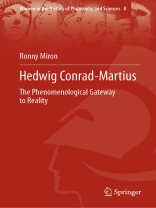This volume, the first of its kind written in English, interprets the realistic-phenomenological philosophy of Hedwig Conrad-Martius (1888-1966). She was a prominent figure in the Munich-Göttingen Circle, the first generation of phenomenology after Edmund Husserl (1859-1938), and was known as the “first lady of German philosophy”. The articles included in this collection deal with the two main themes constituting her realistic-metaphysical phenomenology: Being and the I. In addition, the collection includes a comprehensive Preface that describes the personal background and the social and philosophical contexts behind Conrad-Martius’s thought, with an emphasis on the mutual influence and fertilization of the group of early phenomenologists in the Munich-Göttingen Circle. The book will be of interest to scholars of philosophy and educated readers.
Table of Content
Part 1:The Philosophy of Being.- Chapter 1. From the “Still Covered” to the “Pure Primordial” Phenomena and Back: The External World in the Phenomenology of Hedwig Conrad-Martius.- Chapter 2. The Realism of the Transcendence: A Critical Analysis of Hedwig Conrad-Martius’ Early Ontology.- Chapter 3. The External World – “Whole” and “Parts”: A Husserlian Hermeneutics of the Early Ontology of Hedwig Conrad-Martius.- Chapter 4. The “Gate of Reality”: Hedwig Conrad-Martius’ Idea of Reality in Realontologie.- Chapter 5. The Vocabulary of Reality.- Part 2: The Philosophy of the “I-Being.- Chapter 6. The Phenomenal Experience of the “I”: The Idea of the “I” in Hedwig Conrad-Martius’ Early Phenomenology.- Chapter 7. The Ontological Exclusivity of the “I”.- Chapter 8. The Duality of the “I”: A Commentary on Hedwig Conrad-Martius’s Realistic Phenomenology.- Chapter 9. A Philosophical Resonance: Hedwig Conrad-Martius versus Edith Stein.- Chapter 10. In the Midst of Being: A Journey into the Internality of Being in Hedwig Conrad-Martius’ Metaphysics.- Chapter 11. Essence, Abyss, and Self: Hedwig Conrad-Martius on the Non-Spatial Dimensions of Being.- Chapter 12. The Metaphysical Absolutizing of the Ideal: Hedwig Conrad-Martius’ Criticism of Husserl’s Idealism.- Chapter 13. Faith, Individuality, and Radicalism: A Jewish Perspective on Edith Stein.
About the author
Ronny Miron is a Professor of Philosophy at Bar Ilan University, Israel. Her research focuses on post-Kantian Idealism, Existentialism, Phenomenology, and Hermeneutics, as well as current Jewish thought. She employs an interdisciplinary perspective combining the aforementioned traditions. She is the author of Karl Jaspers: From Selfhood to Being (2012), The Desire for Metaphysics: Selected Papers on Karl Jaspers (2014), The Angel of Jewish History: The Image of the Jewish Past in the Twentieth Century (2014). Her latest publications deal with early phenomenology, in particular, that of Hedwig Conrad-Martius and Edith Stein, and discuss its relation to the phenomenology of Edmund Husserl. Her edited book, Husserl and Other Phenomenologists, appeared in 2018, published by Routledge.












